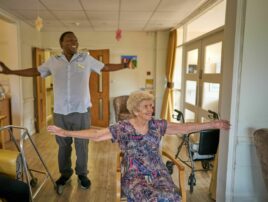
Monday 11th April 2022
Light touches that lift anxiety and depression
Louise Morse
Have you heard about the touch lamps that are connected by the internet? You touch your lamp and the lamp of the person you’re connected with also lights up wherever they are in the world as long as they have WiFi. The person knows you are thinking or praying about them. Just knowing that you mean something to someone else can dispel bleak moods and lighten our darkness, both physically and emotionally. As I was preparing for our next Zoom meeting it struck me again how It’s the little things that are the most effective when it comes to lifting anxiety and depression, especially with older people.
It’s not One Big Thing that does it but a series of small touches over time. In counselling it can be like peeling on onion, removing one toxic thought at a time. But although we don’t have to be trained counsellors to do it, it helps to know what works best.
Some people seem to have a natural insight. For example, my friend Bob who was listening to Pete explain his anxieties about accepting job promotion. Some people in the new team were ‘dodgy’, a few goals were unrealistic, the extra stress might not be worth the bigger salary and it meant getting up earlier in the morning. Instead of trying to knock down the negative thoughts Bob saw that Pete felt that he wasn’t up to the job and would fail. He quoted Psalm 75: 6-7, which says that it is God who gives promotion. ‘Would God set you up to fail, or give you something bad for you?’ he asked. Then reminded him of his achievements so far. Anxiety narrows our focus and we lose sight of the whole picture, seeing only the negative.
In our Zoom meeting today, Janet Jacob and I are looking at practical ways of lifting anxiety and depression, particularly in older people. Helping older people is slightly different to younger – although in a way they are the same, only more so! They have more life experiences, more negative confirmation bias and on the positive side more resilience, although they need to be encouraged to recognise it. Their views of themselves are deeply embedded, and if they are negative take some challenging!
Janet remembers that when she was a home manager she had a resident, who was very anxious and complained about everything. An effective ‘lamp’ touch was when Janet would say, “It’s really lovely to have you here, Joan (name changed). I can’t imagine the home without you!” Only when Joan was validated as a person of worth was Janet able to look at the current source of anxiety.
It’s the same with depression. Anxiety and depression have in common the belief that there’s nothing the person can do about it – that they are helpless and the circumstances can’t be changed.
The first thing to do as I said earlier, is to show the person that he or she is ‘worth it’; that God has planned their life on purpose, and with a purpose. A few days ago I was sitting with a retired school teacher, whose children had grown up and moved away, as they do, and whose husband had died the year before. ‘I feel my life has no purpose,’ she said. I told her about Ephesians 2:10, repeating it slowly. She was silent for a minute or two and then said, ‘Thank you for that.’




































